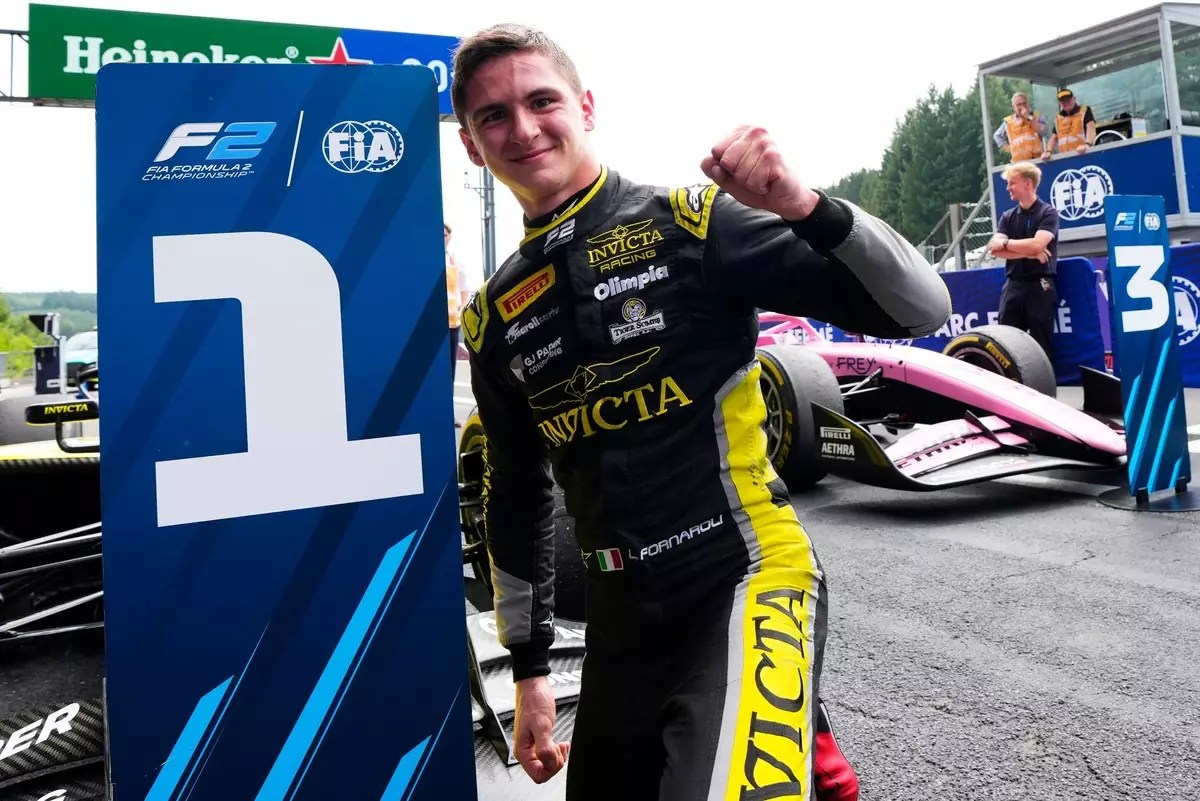In the fiercely competitive world of motorsport, where talent often becomes apparent early and support systems shape career trajectories, Leonardo Fornaroli emerges as a compelling anomaly. Currently leading the Formula 2 championship in his debut year—a feat that typically invites immediate recognition and F1 backing—Fornaroli’s lack of an official F1 development deal is perplexing. It challenges the prevailing narrative that success in junior categories naturally leads to F1 opportunities. This discrepancy should command a reevaluation of how potential is recognized and nurtured in motorsport’s elite ranks.
Fornaroli’s journey is characterized by an understated yet relentless pursuit of excellence. Unlike many of his rivals, whose careers are meticulously managed by well-known academies and branded pathways, Fornaroli’s ascent has been more organic, if not somewhat overlooked by the conventional systems. His resilience and ability to perform consistently under pressure paint the picture of a driver who prioritizes precision over flamboyance. To those who truly understand what F1 teams seek, combined with a keen eye for raw potential, Fornaroli exemplifies the kind of driver that could revolutionize team dynamics—an unheralded performer with the capacity to bring stability and continual development.
Breaking the Mold of Conventional Talent Selection
The narrative surrounding Fornaroli starkly contrasts with that of Gabriel Bortoleto, last year’s F3 champion who quickly secured an F1 seat with Sauber and was absorbed into McLaren’s development program. Bortoleto’s pathway—championship, support, and subsequent promotion—appears more traditional. Yet, Fornaroli’s case simultaneously underscores the limitations of this model. The fact that he remains unattached to an F1 program despite a stellar start in F2 raises critical questions about talent evaluation.
James Robinson, team principal of Invicta, points out that Fornaroli’s style—quiet, consistent, and meticulously disciplined—may not immediately draw the spotlight. Unlike drivers who thrive on media attention or dramatic overtakes, Fornaroli’s strength lies in his methodical execution. Robinson refers to him as a “Moneyball” driver—someone whose value isn’t in flashy moves but in data-driven reliability. This analogy, borrowed from baseball, underscores an essential truth: modern F1 increasingly values consistency, adaptability, and low-error performance over raw aggression or media charisma.
This perspective is vital because it calls into question whether current talent scouting emphasizes the right qualities. If F1 teams prioritize drivers who excel in simulated data, develop a car seamlessly, and maintain composure through adversity, Fornaroli seems tailor-made for such a role. Yet, he remains an external candidate, shining in F2 but unclaimed for the pinnacle of motorsport. This disconnect suggests a systemic misjudgment—perhaps a fixation on high-profile names or overt spectacle overshadows the quiet genius that Fornaroli exemplifies.
The Power of Reliability and Developing Car Performance
The true hallmark of Fornaroli’s racing is his exceptional consistency, which Robinson highlights through his impeccable race craft. In a sport where race wins often hinge on daring overtakes or dramatic battles, Fornaroli’s strength is in steady, measured lap times that steadily erode opposition. Robinson illustrates this with an anecdote from a Spa sprint race, where, despite intense competition and tactical challenges, Fornaroli maintained a composed pace, ultimately winning comfortably.
This kind of performance underscores the importance of reliability—an attribute that F1 teams crave for their development programs. The ability to produce stable, predictable data across multiple sessions and race conditions is vital for car development and understanding vehicle dynamics. Drivers who can offer this level of consistency accelerate the development process, often saving teams substantial resources and time.
Fornaroli embodies this trait, and if his talent is recognized for what it truly represents, he could be an invaluable asset in fostering better car-homologation and performance development in F1. His potential role isn’t just about winning races but about helping teams refine their machinery through stable, reliable feedback—a role that is often undervalued in driver assessments but absolutely critical in the high-stakes environment of Formula 1.
Why Overlook the Quiet Talent? A Missed Opportunity
The broader implication of Fornaroli’s sidelining is a profound critique of how the sport might be missing out on a generational talent. With most top drivers in the championship affiliated with F1 academies—a model that both channels talent but perhaps also filters out unorthodox candidates—Fornaroli’s situation signals a fault line in talent identification.
Robinson doesn’t hold back when expressing his astonishment at Fornaroli’s absence from any formal F1 radar. His description of Leo as a “Moneyball” style candidate isn’t just a clever analogy; it’s a call for a paradigm shift. Why should the most important drivers always come from predictable paths when the less flashy, steadier performers might contribute more profoundly to a team’s long-term success?
This perspective suggests that the future of driver development might need to embrace a more nuanced approach—one that values composure, data literacy, and learning capacity as much as raw speed and media appeal. Fornaroli challenges the conventional wisdom, implying that F1 teams could benefit immensely from backing drivers who provide stability and foster development, even if they don’t fit the traditional mold of a “young star.”
His case should serve as a wake-up call: the sport risks overlooking a hidden engine of progress—a driver whose true worth isn’t immediately obvious but could prove invaluable in a sport where consistency and development are king. Ignoring this silent talent pool may be the most significant oversight of all in an era that claims to prize innovation and fresh thinking.


Leave a Reply